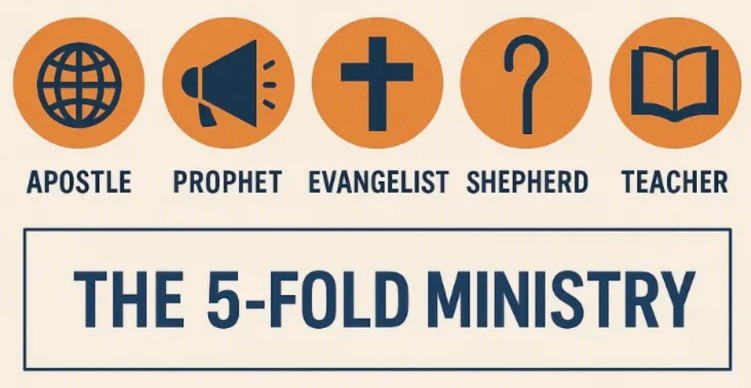APEST Series #1 | The Friend You've Buried Alive - How to Build a Raw, Real, Spirit-Led Church by Releasing the Prophetic Voice on Your Team
The Ministry Voice Your Church Keeps Ignoring (and Firing!)
Front Note #1: Thank you to my mentor, Greg Getz, for contributing to this tool! Greg has been a long-term mentor and friend and an invaluable source of wisdom in catalyzing disciple-making networks.
Front Note #2: If you want to join a community of co-laborers launching missional simple churches, join my 💥 PREMIUM COHORT 💥. Meet monthly by Zoom with other disciple-making co-laborers. And get FREE access to my Simple Bible Notes web app and the 24/7 Virtual Disciple-Making Coach. Find out more by 🤜 CLICKING HERE 🤛.
Front Note #3: ✔︎ Click HERE for a high-level overview of the GREAT TEAM!
The GREAT TEAM Series | The Prophet
Over the next Five Weeks, with the help of AI and utilizing years of APEST research, I will be posting this exact same article for each of the five GREAT TEAM functions - the apostle, prophet, evangelist, shepherd, and teacher. These GREAT TEAM members are described in Ephesians 4:11, and their job is to equip the saints to accomplish the ministry of God’s people on planet earth most effectively.
I started with the prophetic gift because it is the team member who has been most silenced and misunderstood. I am intentionally creating the document with the exact same format to clearly show you the differences between each Great Team Member.
🎉 Enjoy the series! 🎉
Click HERE for an overview of THE GREAT TEAM
Click HERE for Article #2 - The Apostle
Click HERE for Article #3 - The Evangelist
Click HERE for Article #4 - The Shepherd
Click HERE for Article #5 - The Teacher
Click HERE for Ideas on a Radical Church Reset
The Prophet
A Coaching Tool From the Disciple-Making Collective
Let me ask you something that might sting a little: When was the last time someone in your discipling community told you that your “brilliant strategy” was actually misaligned with the Holy Spirit and/or the Word of God? And what did you do?
Yeah. Uncomfortable, right?
Here’s the deal: Ephesians 4:11 gives us five leadership functions that advance Faith Communities and equip the saints: Apostle, Prophet, Evangelist, Shepherd, and Teacher. You know the last three. And you can probably identify the Apostle (the church planter, the missionary, the entrepreneur).
But the Prophet? That’s the one that makes everyone 😳 NERVOUS 😳.
What Is a Prophet? (And No, They’re Not Fortune Tellers)
Let’s kill the bad teaching right now:
A Prophet is a spiritual provocateur highly attuned to God’s voice and will, who probes conventional thinking and brings challenge, correction, and accountability to the disciple-making community or simple church.
Here’s what that function in the community actually looks like:
Hears and speaks a specific word from God to specific people
Truth-teller to believers (not the lost, that’s the evangelist’s job)
Holds the community accountable and brings challenge and correction
Questions the status quo and produces counter-culture
Often unappreciated (James 5:10-11 👉 check it)
Tells the truth without fear of consequence
Subject to other prophets for verification (1 Cor 14:32)
The Problem: Undiscipled Prophets Are Dangerous
Here’s what happens when a Prophet doesn’t have accountability and discipleship:
They become a belligerent activist (it’s no wonder they get invited to leave)
They disengage from reality and become “too heavenly minded to be any earthly good.”
They lose alignment with the rest of the Ephesians 4:11 team
An undiscipled Prophet is like a 🩺 surgeon with a scalpel but no training; they’ll cut, but they won’t heal.
Discipling the Prophet: Four Critical Areas
1. Their Uniqueness
✔︎ The Reality:
Prophets are unlike any leadership presence most Christians will encounter. Their spiritual intuition, rooted in deep knowledge of Scripture, can be intimidating. Their words often run against traditional thinking and can sound harsh or judgmental.
🎯 Your Action as a Discipler:
Acknowledge, appreciate, and bless their uniqueness.
Don’t try to make them “fit in.” Don’t try to tone them down. God wired them this way for a reason. Your job is to help them steward their gift, not suppress it.
2. Their Presence
✔︎ The Reality:
The way Prophets communicate may seem unloving. But here’s the truth: They don’t love people less; they love the purity of Scripture and the holiness of God MORE.
🎯 Your Action as a Discipler:
Help them understand this: “You catch more bears with honey than sticks.”
Prophets need to learn that loving people is critical to delivering the Word of the Lord. Contrarian words must be delivered with the sweetness of honey (Psalm 119:103).
You’re not asking them to compromise truth. You’re asking them to deliver truth in a way people can actually receive it.
Think about it in Three-Thirds terms: They need to balance the LOOK BACK (relationship), LOOK UP (truth), and LOOK FORWARD (application). Prophets default to LOOK UP. Your job is to help them see the power of relationship.
3. Their Function
✔︎ The Reality:
We’ve all been in that meeting. Someone pitches a “brilliant strategy.” Everyone’s excited. Then that one person finds the flaw. The room goes silent. The momentum dies.
Everyone’s thinking: “Who invited this guy?” “What a Negative Nellie.” “Just ignore this idiot.”
But here’s what you need to understand: The Prophet isn’t a dysfunctional person of negativity. They see the flaws where an end-run has happened around the Holy Spirit. They cannot be silent.
💥 The Hard Truth: 💥
Contemporary Prophets are still being stoned. Not with rocks, but they’re fired, ignored, insulted, unfriended, and spiritually ostracized.
🎯 Your Action as a Discipler:
You have TWO jobs:
Help the prophet shrug off the “stones” by encouraging and loving them. Remind them they’re not crazy, they’re called.
Disciple the group or individual the Prophet confronted. Be a co-prophet. Confront those who are throwing stones.
🗝️ Key Principle: 🗝️
When the Prophet is silent, all is well. But when they speak, the Holy Spirit is likely interjecting into human “genius.”
Don’t shoot the messenger.
👂 Listen to the message.
4. Their Recruitment
✔︎ The Reality:
Prophets are often lonely. They’ve spent a lifetime being told to “go with the flow.” They’ve been called divisive. They’ve been told their gift is from the devil. People have distanced themselves from them.
They’re shy. They’re wounded. They’re isolated.
🎯 Your Action as a Discipler:
Discipling the Prophet begins BEFORE they join the team.
Here’s what to look for through prayer, Holy Spirit whispers, and spiritual discernment:
They love the Word of God and have dived deep into it
They perceive how the world contradicts the Word
They have awareness of people’s hidden intentions
They have clarity of thought and speech in summarizing all of the above
When you find this person:
Come alongside them
Recognize and affirm how God has gifted them
Love them
Share with them their Ephesians 4:11 function, their Uniqueness, Presence, and Role
How This Fits the DMC Pathway
In the Disciple-Making Collective, we’re committed to the Jesus pattern of disciple-making. That pattern includes all five Ephesians 4:11 functions working in alignment.
Here’s where this hits our tools:
In your X-Groups: Are you creating space for prophetic voices, or are you shutting them down?
In your Discipling Communities: Are you recognizing and stewarding the prophetic gift, or ignoring it because it’s uncomfortable?
In your House Churches: Are you practicing the 9 Behaviors of Church in a way that allows Prophets to function, or are you creating an environment where only Teachers and Pastors can thrive?
In IOI (Iron-on-Iron) coaching: Are you asking the hard question: “Who on your team is the Prophet, and are you listening to them?”
Your Next Step
Here’s what I want you to do:
1. Identify the Prophet in your sphere.
Who’s the person who always asks the hard questions? Who sees the flaws in your plans? Who makes you uncomfortable but is usually right?
2. Pray for them.
Ask God to give you wisdom to disciple them well.
3. Love them.
Reach out this week. Tell them you see their gift. Tell them you value them. Tell them they’re not crazy.
4. Create space for their voice.
In your next Three-Thirds meeting, ask them: “What is the Holy Spirit showing you that we’re missing?”
The body of Christ needs all five functions.
🚫 Don’t silence the Prophet.
❤️🔥 Disciple them.
For more on building healthy discipling communities that include all the Ephesians 4:11 functions, check out the tools at Disciple-Making Collective.





“Prophets are often lonely. They’ve spent a lifetime being told to “go with the flow.” They’ve been called divisive. They’ve been told their gift is from the devil. People have distanced themselves from them. They’re shy. They’re wounded. They’re isolated.”
This quote hits eerily close to me. And gives perspective as well.
I got “Biblical reformer” taking the APEST test.
Kevin… WOW. This whole series is absolute gold. I’m blown away. If the church grabbed hold of this—stopped trying to be each other, and actually lived from the strengths God wired into them—we’d see so much real growth. This is going to help so many people. Thank you!!!